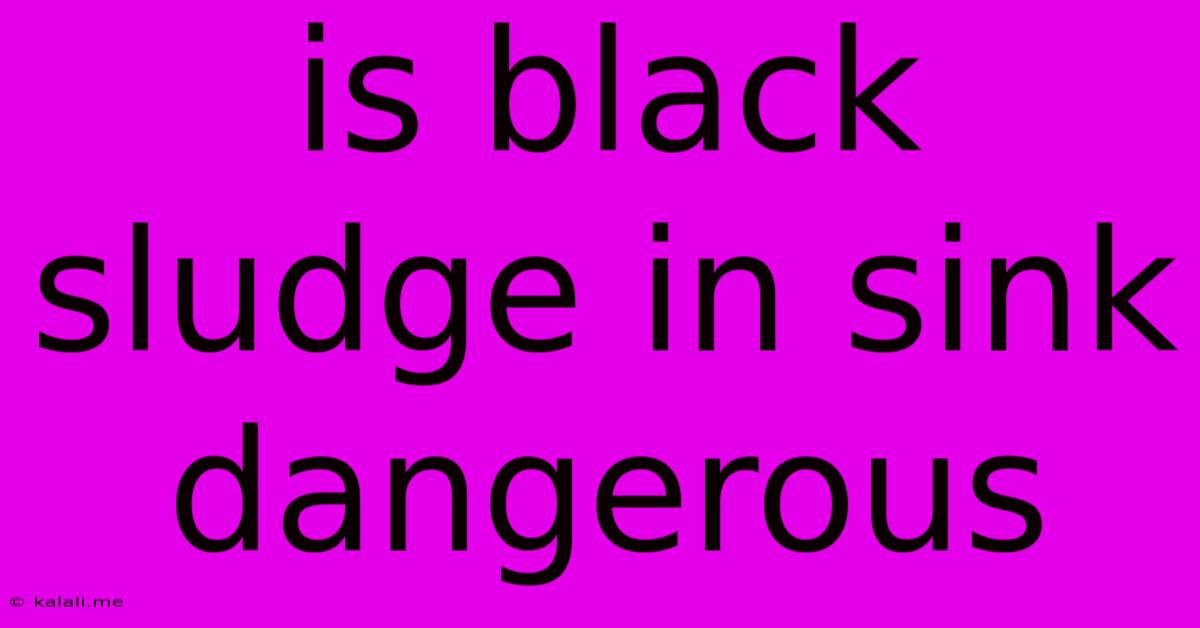Is Black Sludge In Sink Dangerous
Kalali
Jun 08, 2025 · 3 min read

Table of Contents
Is Black Sludge in Your Sink Dangerous? A Comprehensive Guide
Finding black sludge in your sink is undeniably unsettling. That murky, dark substance raises immediate concerns about safety and potential health hazards. This comprehensive guide will explore the causes of black sludge in sinks, assess the associated risks, and provide practical steps to address this issue. Understanding the source is crucial for determining the level of danger and the appropriate remediation strategy.
What Causes Black Sludge in Sinks?
The appearance of black sludge typically points towards a build-up of organic matter and potentially harmful bacteria. Several factors contribute to its formation:
-
Biofilm: This is a primary culprit. Biofilms are complex communities of microorganisms, including bacteria, fungi, and algae, that adhere to surfaces. They thrive in moist, dark environments, such as the pipes under your sink. The black color often stems from the presence of iron bacteria, which oxidize iron in the water, resulting in a dark, slimy deposit.
-
Mold and Mildew: These fungi can also contribute to the black discoloration. They grow in damp areas and release spores that can trigger allergies and respiratory problems.
-
Sediment and Mineral Deposits: Hard water can leave behind mineral deposits, which, combined with organic matter, contribute to the sludge's formation. This is particularly common in older plumbing systems.
-
Sewer Gases: In some cases, black sludge can indicate a problem with your sewer line. This is less common but signifies a serious issue requiring professional attention. The smell associated with sewer gases is a significant warning sign.
Is Black Sludge Dangerous? Assessing the Risks
The danger posed by black sludge depends heavily on its composition and the extent of the contamination. While not all black sludge is inherently hazardous, it's crucial to exercise caution:
-
Bacterial Infections: The biofilm contains various bacteria, some of which can cause illness if ingested or if they come into contact with open wounds. This is a significant risk, especially for individuals with weakened immune systems.
-
Respiratory Issues: Mold and mildew spores released from the sludge can aggravate respiratory conditions like asthma and allergies. Inhalation can lead to coughing, sneezing, and breathing difficulties.
-
Skin Irritation: Direct contact with the sludge may cause skin irritation or allergic reactions in sensitive individuals.
-
Water Contamination: If the sludge is significant, it could contaminate your drinking water, increasing the risk of waterborne illnesses.
How to Deal with Black Sludge in Your Sink
Addressing black sludge requires a multi-pronged approach:
-
Cleaning the Sink and Drain: Begin by thoroughly cleaning the sink and drain with a solution of bleach and water (always follow the bleach manufacturer's instructions). Scrub the affected areas vigorously.
-
Pouring Boiling Water: Pouring boiling water down the drain can help loosen and dislodge some of the accumulated sludge.
-
Baking Soda and Vinegar: A mixture of baking soda and vinegar can effectively clean drains and help eliminate odors. Allow the mixture to fizz for several minutes before flushing with hot water.
-
Commercial Drain Cleaners: Use commercial drain cleaners sparingly and only as a last resort, following the manufacturer's instructions carefully. These cleaners can be harsh and potentially damage your pipes.
-
Professional Plumbing Inspection: If the black sludge persists or is accompanied by foul odors, contact a licensed plumber. They can identify the underlying cause, such as a problem with your sewer line, and implement appropriate repairs.
Prevention is Key
Preventing the formation of black sludge requires proactive measures:
-
Regular Cleaning: Clean your sink and drain regularly to prevent the build-up of organic matter.
-
Proper Ventilation: Ensure adequate ventilation in your bathroom to reduce moisture.
-
Regular Drain Maintenance: Periodically flush your drains with hot water to help prevent clogs.
-
Water Filter: Installing a water filter can reduce mineral deposits and improve water quality.
In conclusion, while not all instances of black sludge are immediately life-threatening, it’s a clear sign that your plumbing system needs attention. Acting promptly and employing the appropriate cleaning and maintenance strategies will safeguard your health and the longevity of your plumbing system. Remember, if you're unsure about the cause or the best course of action, always consult a qualified plumber.
Latest Posts
Latest Posts
-
Read One Punch Man Manga Online Free
Jun 09, 2025
-
2010 Ford F150 Serpentine Belt Diagram
Jun 09, 2025
-
How To Put Strap On Acoustic Guitar
Jun 09, 2025
-
The Kingdom Of Heven Will Not Come With Observation
Jun 09, 2025
-
Parable Of The Ten Bridesmaids Meaning
Jun 09, 2025
Related Post
Thank you for visiting our website which covers about Is Black Sludge In Sink Dangerous . We hope the information provided has been useful to you. Feel free to contact us if you have any questions or need further assistance. See you next time and don't miss to bookmark.